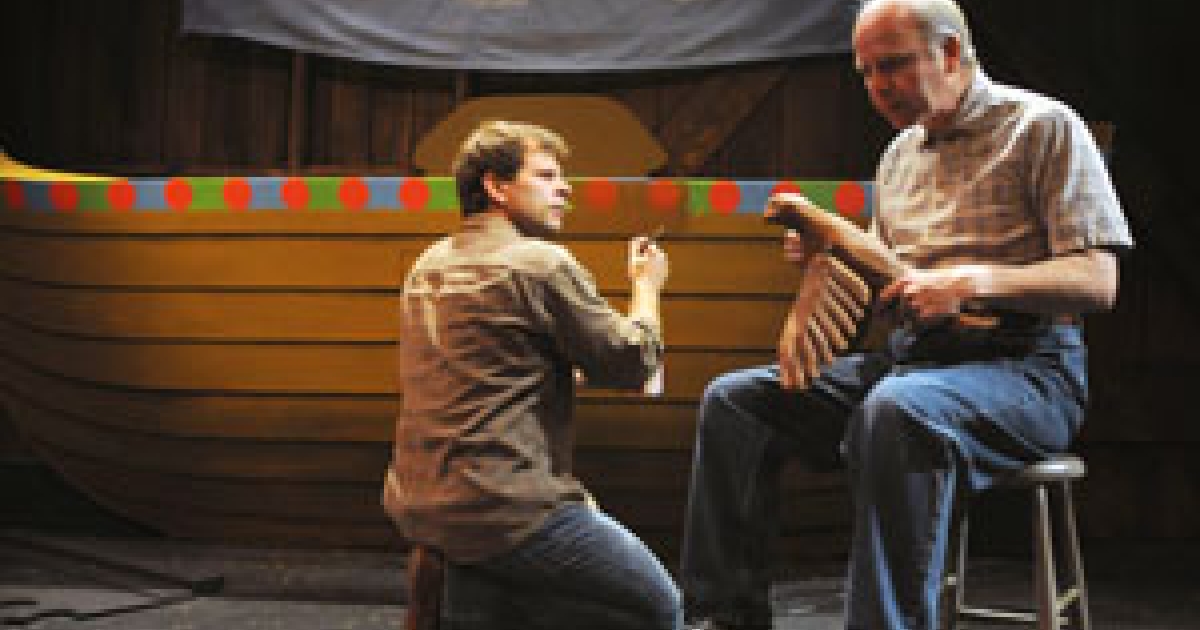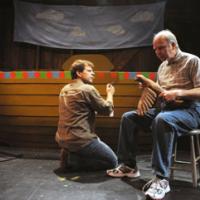Review From The House
READ IT • SEE IT • TASTE IT • LIVE IT
Mourning Dove

Mourning Dove
Mourning Dove by Emil Sher
Directed by Angela Konrad
Pacific Theatre
Oct 17 to Nov 15, 2008
Photos of Kerry Van Der Griend and Ron Reed in Mourning Dove by Damon Calderwood. Vancouver, BC.
Pacific Theatre opens their 25th season with Montreal playwright Emil Sher's powerful little gem of a play, Mourning Dove. Don't miss it. Sher draws on the tragic Latimer affair to present two interwoven emotive and complex themes; the morality of love and the dichotomy of law and justice. I doubt whether there was a sentient adult in Canada in 1993 who did not have a strong opinion as to the right or wrong of Robert Latimer's motives in ending the life of Tracy, his severely disabled daughter. Some thought him principled and courageous - others labelled him the worst of murderers. We all see things through the lens of our personal life experiences.
My lens, as a parent who aches at any hurt inflicted on my child, is polarized by my experiences as a resident in pediatrics. I was assigned for a rotation to provide medical care to patients who lived in a long term care facility and were as severely disabled as Tracy. Immobile, lacking speech or the ability to feed themselves, most had been there for years. They were essentially "warehoused" by their families who never visited, relinquishing them to the competent but certainly not loving, care of professionals. Contrast that to the Latimer family who cherished and cared for their daughter for thirteen years on their Saskatchewan farm.
Sher takes up the story of farmer, Doug Ramsay (Kerry Van der Griend) as he and wife Sandra (Anita Wittenberg) are waiting to hear when daughter, Tina (Laura Van Dyke) is to be scheduled for yet another surgery. This time it is for a "salvage" operation to relieve, at least temporarily, the unremitting pain that denies her peaceful sleep and rest. In a sensitively restrained perfomance, Van der Griend paints a moving picture of an intrinsically good man, who loves his damaged child and nurtures her soul with story telling through plays using intricately carved puppet animals. Wittenberg portrays Sandra as a deeply conflicted mother, who wishes for someone or something to relieve her daughter's pain but can't force herself to take action.
The puppet animals are carved for Tina by Keith Martel (Ron Reed), a mentally challenged family friend, who also showers his affection on Tina. Keith's child-like questioning of the absurdities of life and the English language, add a welcome touch of humour and also allow us to see the infinite patience and kindness that lie at the heart of Doug's character. Reed matches Van der Griend's insightful performance with a perfectly pitched portrayal of a simple man, aware that he is "different" but secure in the affection of Doug and Sandra. Until the moment he learns the truth about Tina's death.
Never seen but metaphorically as a pool of light, heard only through her laboured breathing, moans and soft cries, Tina's presence permeates and indeed dominates the narrative, much as a wooden ark dominates the set.
The drama that Doug and Keith enact for Tina is the story of Noah. The play is laden with symbolism and metaphor. In the ark there is only room to save two of every species. Who decides which are saved, and what happens to those for whom there is no place? Noah frees a dove to find a permanent place of rest. Who will free Tina? And Keith? He thinks of himself as kindred spirit to Tina - a "freak of nature". If she can be killed, will he be next?
And that is where our after -show discussion led: directly to the logical fallacy of the "slippery slope" argument. I argue that by hypothesizing about unknown possible future actions that could occur, one can not fairly evaluate or judge one specific action that occurs within a specific context. It is not fair to punish someone out of fear that someone else might later do something worse.
I ask myself how it would feel to watch the child that you desperately want to shelter and protect, experience unremitting, unrelenting pain, with the prospect of yet another painful operation ahead. People argued of the Latimer case that ending Tracy's life meant that her life was not valued. I think that it means that her father valued her life more than his own because in order to relieve her pain, he was willing to risk spending the rest of his life in torment. And that what subsequently happened to him may have been right in the eyes of the law but was an immense failure of justice.
What do you think?


